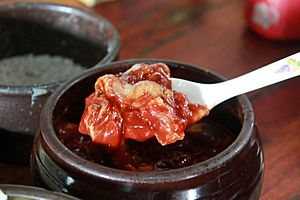Guljeot facts for kids
 |
|
| Alternative names | Salted oyster |
|---|---|
| Type | Jeotgal |
| Place of origin | Korea |
| Associated national cuisine | Korean cuisine |
| Korean name | |
| Hangul | |
|---|---|
| Revised Romanization | guljeot |
| McCune–Reischauer | kukjŏt |
| IPA | [kul.dʑʌt̚] |
Guljeot (굴젓), also known as salted oyster, is a special Korean side dish. It's a type of jeotgal, which means it's seafood that has been salted and fermented.
Think of fermentation as a natural process that helps preserve food and gives it a unique flavor. Guljeot is very popular in Korean cuisine. People usually eat it as a banchan (a small side dish) alongside bap (cooked rice).
How to Make Guljeot
Making Guljeot involves a few steps to turn fresh oysters into this tasty side dish.
First, small, fresh oysters are carefully opened. This process is called "shucking." Then, they are gently washed using salt water.
Next, the oysters are mixed with coarse salt. They are then left to ferment for about five days. This fermentation process helps to develop the unique flavors and textures of the dish.
After five days, the oysters are ready for seasoning. People add minced garlic and finely chopped onion. They also add gochutgaru (which is chili powder) for a bit of spice. Sometimes, thin strips of Korean radish or even pear are added too.
Finally, the seasoned Guljeot is aged for another three to four days. When it's ready to be served, a little bit of sesame oil is drizzled on top. This adds a nice nutty flavor.
Images for kids
 | Frances Mary Albrier |
 | Whitney Young |
 | Muhammad Ali |


